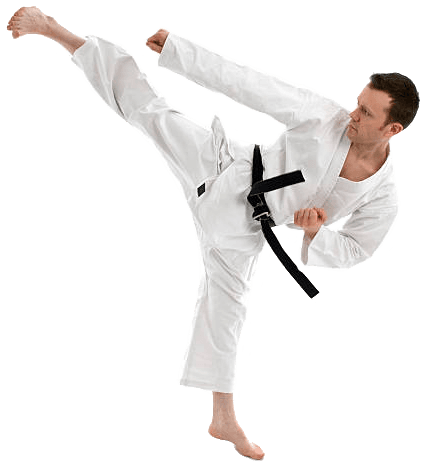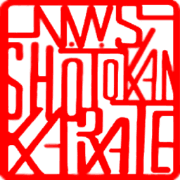
ABOUT
Our instructors are accomplished, high-ranking black belts who take their teaching seriously, especially towards children, combining a comprehensive education in well-established, orthodox karate practice and philosophy with modern sports-orientated competition karate.
Traditional karate is about effective self-defence under all conditions. When we refer to traditional karate, we mean more than just kicks, punches and blocks. Shotokan's founder Gichin Funakoshi emphasized that a fight can end up on the ground, for which you need skills other than kicking, punching and blocking. Karate is an all-encompassing fighting system that includes throwing techniques, strangleholds and joint locks, all of which are found in kata applications. So our program goes much further than other karate approaches. It includes the study of various martial arts, particularly ju-jitsu and judo, both of which teach the use of leverage and correct technique to throw or take an opponent down to the ground, or to immobilize or subdue an opponent by executing a grappling manoeuvre, joint lock or strangle hold. In terms of self-defence, these martial arts assist smaller, weaker people to successfully defend themselves against a bigger, stronger attacker.
We believe in the benefits of competition, or sport karate. Sport karate helps teach self-discipline, socialization skills, concentration, strict attention, and respect, so lacking in today's society. These benefits collectively help to improve ones general behaviour, conduct and academic performance.
We also believe our method of traditional karate is fundamental to acquiring the necessary skills for effective self-defence in both adults and children. Regardless of age, students develop physical fitness, muscle co-ordination and control, perseverance and mental health.
Examinations for each new belt level are a good exercise in motivation and in setting and achieving goals.
New World Shotokan Karate South Africa was established in order to address the unique situation faced by South Africans based at the southern part of Africa and to enable them to control their own karate destiny.
New World Shotokan Karate South Africa maintains its relationship of mutual respect, friendship and co-operation with the World Shotokan Karate-do Federation and its members.
New World Shotokan Karate South Africa is a highly-disciplined organization that adheres to the traditional way of karate. Many of its senior instructors have received intensive training in Japan and are respected high-graded international instructors in their own right.
The organization's national administrative office is located in the Northern Cape region, with member clubs spread across the country.

TRIBUTE TO
SENSEI NIGEL JACKSON
It's impossible in a few paragraphs to capture the full scope of the karate impact of Sensei Nigel Bernie Jackson, who passed away on 30 August 2020 at the age of 79. Though born in South Africa, he grew up, was educated and got married in Northern Rhodesia (now Zambia) but, after saving up some pocket money, he and his wife Yvonne decided in 1963 to move to a bigger city in South Africa.
He got involved in karate soon after arriving in Johannesburg and always liked to tell the story of how he decided to study in Japan. In 1965, four of the JKA's top instructors — Keinosuke Enoeda, Hirokazu Kanazawa, Hiroshi Shirai and Taiji Kase — visited South Africa for six months, which was big news for a country only beginning to dabble in the Shotokan. Nigel was a purple belt at the time when Enoeda tested the courage of a student at Stan Schmidt's Orange Grove dojo. Nigel had previously never seen a real Japanese and was excited at the prospect of receiving karate instruction from one. He arrived late and when he entered the dojo Enoeda was already on the floor, stripped to his waist wearing only his gi pants and belt. Watching from one side of the dojo was a group of Indians and Coloureds (mixed race) — in those days only whites were allowed by the apartheid government to practice karate — and Nigel went over and joined them. All other karateka were still in the changing room. Enoeda limbered up with various kihon techniques, mainly kicks and punches, with speed, power and timing unknown to these spectators. He then moved in front of a standing mirror and repeatedly performed Tekki Nidan kata. Enoeda suddenly stopped and bellowed towards the changing room for the students to come onto the floor. Their fear was obvious to Nigel. They stumbled rather than walked out and they all looked scared. An older member ran over to Nigel and told him to change quickly into his gi and join the training. Enoeda must have seen this exchange. Holding up his hand in rejection, he shouted, “No! No! He cannot! Now too late!” Nigel recalled his relief. He was glad he could sit back and watch from the side. Much easier for me to concentrate on every move Enoeda made.
Halfway through the session, though, an incident occurred that would stamp on Nigel's memory an unforgettable image of Enoeda. “He selected a student for a one-on-one demonstration of basic ippon kumite. He could see this poor guy was very nervous, very tense. Enoeda told him to stand still in ready position. “Like zis,” and he showed the stance he wanted. He set his distance and erupted into a fighting stance. It was a fearsome thing to see. Enoeda shouted at the student, “You no move! I attack jodan!” Absolute terror was mirrored on this guy's face and he thought he was mesmerized. The fright must have been too much. If Enoeda had intended merely to impress with his power and skin-touch control, a tiny nervous twitch changed all that. As Enoeda launched his lunge punch the student appeared to rock slightly forward, altering Enoeda's initial focus point by a fraction and forcing him to adjust it while in motion. The punch hit its target squarely and the student crashed to the floor. “What a knockout!” Nigel recalled. “Enoeda was definitely concerned. He straddled over the student, tapping him on the cheek, trying to revive him. Once the student regained consciousness and was able to stand up, Enoeda's attitude changed from concern to irritation. Now he gripped the poor guy by the lapels and shouted at him: “Why you move? I say no move! You move! Why!?” He never saw that student return to the dojo again. Nigel was fascinated by Enoeda's obvious proficiency, an experience that served as the catalyst for driving him to study karate in Japan. He decided then and there to master karate like this Japanese instructor and he was convinced that he had to learn from the Japanese themselves in Japan.
Nigel and Yvonne lived in Tokyo from January 1967 to July 1971, during which he gained entry to the vaunted JKA instructors' class, still in its infancy following the departure from Japan to the U.S. of Hidetaka Nishiyama and Teruyuki Okazaki, who were not involved in the heavy and dangerous training that became the JKA's trademark. It was Hiroshi Shoji who realized the need to inject a vital ingredient so lacking in the Shotokan of the early 1960s: a fanatical devotion to fighting. Nigel remembered Shoji as “a man of few words but an excellent communicator when instructing. He never displayed any of the prevalent hostility towards foreigners, something I never forgot. He was a very able dojo fighter and would instantly reject anyone, including the Japanese, who exhibited an unwillingness to fight, particularly if it ended up in a brawl.”
Nigel graded to sandan in that unforgiving karate environment, an exceptional achievement by any standards. Nearing the end of his Japan stay and his future uncertain, fate intervened in the form of a proposal in 1971 from George Higginson, the owner of the Kodokwai dojo in Durban, that Nigel accept a three-month instructing stint there as part of the South African JKA Karate Association (SAJKA). It wasn't easy. He instructed in the only way he knew — the very hard Japanese way — and after the first month the dojo membership dropped from about 300 to 200. An angry Higginson called Stan Schmidt and referred to Nigel as “this bloody white Japanese”. A very good thing came out of the Durban stint, however. Part of Nigel's job was to run a fitness class for businessmen at the dojo. One of the participants, a senior manager in a Swedish steel company, offered him a job in their Cape Town branch. As soon as his Durban contract was over, he and his family relocated to Cape Town.
Nigel was a thinker in the sense that he consistently encouraged the SAJKA shihankai to apply their minds to changing policies that would benefit students nationwide and stimulate healthy growth for the future, but his insights were too revolutionary and his maverick approach undoubtedly contributed to his eventual resignation from the SAJKA in 1980.
To legions of his students, Nigel Jackson was a forward-thinking, extremely wise karate leader who always gave the right advice as he guided them in their training. And who better to learn from than an instructor who had accomplished what no other in South African had done: training six days a week over four and a half years of continuous immersion in the Japanese Shotokan karate way and never giving up.
They recall his strict, intense karate approach and his insistence on total commitment to their study of the ideals of budo: courtesy, integrity, humility, and self-control. For him, budo was not a sport but rather a way to follow through life. To train properly was to establish hontai, which is morality and to establish morality was to increase humanity's ethical conduct.
They recall how he applied discipline in his dojo but abhorred bullying and gratuitous abuse, and taught them the true meaning of the sempai/kohai relationship. They recall how he gave them so many opportunities as students, competitors, instructors, officials and administrators, both in South Africa and internationally.
They recall his humility and how he would cringe when senior Shotokan practitioners, either mistakenly or perhaps for an egotistical rush, anointed themselves with titles beyond the simple “sensei”.
In his later years, Nigel handed control of his organization to his most senior students but remained its quintessential leader, deeply imbued with the skill and experience of an elder karate statesman, revered and respected worldwide by all who came into contact with him.



